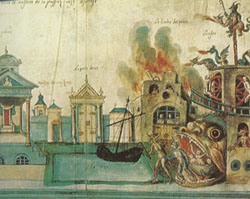
TheatRE in Roman society was a bit more fast and loose than the Greeks. In addition to staging (and perhaps mockery) of Greek comedies, the Roman Coliseum was filled with gladiatorial combat and naval battles. Needless to say, it was a poor time to be a Christian. Like the Greeks, historians tell us that audiences made little distinction between what was "culture" and what was "sport". Rowdy catcalls were absolutely part of the Roman drama. Additionally, the physical structure of the Roman theatER was borrowed from the Greeks--a semicircle where audience members could see one another.
After the fall of Rome, theatre became more or less unpopular and more or less survived through the dark ages--like many other institutions--through the clergy of the Catholic Church. Local festivals were held to reinact holy days, as well as morality plays that--like the Greek tragedies--could be used as teaching tools. Communities would unite to produce these reinactments as a source of local and civic pride to see which town could come up with the "best" pagent. Local merchants would sponsor wagons that depicted scenes from biblical tales--not unlike Mardi-Gras or homecoming parades, albeit without the religious bent. Like the Greeks, these pagents utilized the resources of local communities. The actors were farmers, merchants, and the clergy. While political policy may not have been debated, these week-long events allowed the citizens of medieval Europe to take pride in their community, as well as take an active role in the creation of the theatre. It was, in effect, a holiday.
No comments:
Post a Comment